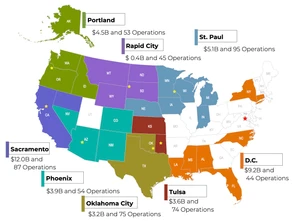NIGC: Record 2023 shows adaptability and resilience of Native American gaming

The 2023 figure was 2.4%, or $967.6m, higher than the $40.94bn posted by the NIGC in the previous year. Data covers Native American gaming operations across eight regions: Portland, Sacramento, Phoenix, St Paul, Rapid City, Tulsa, Oklahoma City and Washington DC. These span 527 tribally owned, operated or licensed establishments across 29 states.
All eight regions reported year-on-year growth in 2023. Sacramento remained the primary source of NIGC revenue at $11.97bn, up 1.8% on 2022’s total. The Sacramento region covers California and northern Nevada.

DC took second with $9.19bn, up 2.4%. Native American operations in this region include New York, North Carolina, Florida, Alabama, Mississippi and Louisiana. St Paul – covering Michigan, Indiana, Minnesota, Wisconsin, Iowa and Nebraska – saw revenue rise 2.8% to $5.09bn,
As for the region with the highest growth, the title in 2023 went to Phoenix. For the full-year, revenue increased by 5.5% to $2.93bn. This region includes southern Nevada, Arizona, New Mexico and Colorado.
These include 245 tribes across the 29 states, with each required to submit figures covering financial activities of each class II and class III gaming operation on the tribe’s lands for each fiscal year.
NIGC hails “ingenuity and tenacity” of tribal gaming operators
Not only was 2023 a record year for the NIGC, it was also the third consecutive year of GGR growth. In fact, had it not been for the decline in 2020 – the year of the pandemic – revenue would have been higher in each year since 2010, when GGR was level year-on-year.
Revenue has now more than doubled since 2004’s $18.5bn total.
“This year’s GGR results demonstrate how a strong regulatory framework and diversity of tribal gaming enterprises generates growth in the gaming industry,” acting NIGC chair Sharon Avery said.
“Again, this year, tribal gaming operators and regulators have proven that their ingenuity and tenacity are catalysts for growth, even in the face of an ever-changing gaming landscape. This steadfastness will ensure that tribal gaming remains a valuable resource for continued economic sustainability in tribal communities.”
For vice-chair Jeannie Hovland 2023’s performance showed the success of the Indian Gaming Regulatory Act (IGRA).
“I congratulate the industry regulators, operators and tribal leadership on another successful year,” she said. “Their hard work in meeting and overcoming the challenges presented by an increasingly competitive market is evidence that tribes are resilient and their gaming expertise is yielding benefits for their nations as IGRA intended.”
Technology a key driver of 2023 growth
Not only did revenue growth reflect the viability of tribal gaming operations, it also showed its adaptability the NIGC added.
It continued to adapt to technological advances and changes in consumer preferences. “Tribal governments and the operations they license continue to explore new and innovative ways to expand and deliver world-class experiences to cultivate sustainable economies.”
After Florida, are tribes sports betting power brokers?
Tribal gaming expansion stretches into Las Vegas, with the Seminole tribe the first Native American operator on the Strip after acquiring The Mirage, which will be demolished and replaced with a Hard Rock property.
Developments in Florida suggest tribal influence in gaming expansion is poised to grow significantly as well.
Last week, news broke that the the US Supreme Court had denied the writ of certiorari in the Florida sports betting case filed by West Flagler and Associates (WFA).
Effectively, the decision means digital sports betting can remain live in Florida, on the basis that any bet placed in Florida is considered to be placed on tribal lands, if it runs through a server located there. The Seminole tribe launched its Hard Rock Bet platform in November 2023.
So, what next?
The ruling potentially has ramifications for tribal-dominated states such as California, Minnesota and Oklahoma. If the Supreme Court is willing to rule in favour of Seminole in Florida, will other states look to strike similar compacts?
In turn, this may hand more negotiating power to the tribes, as Jill R. Dorson explains.
